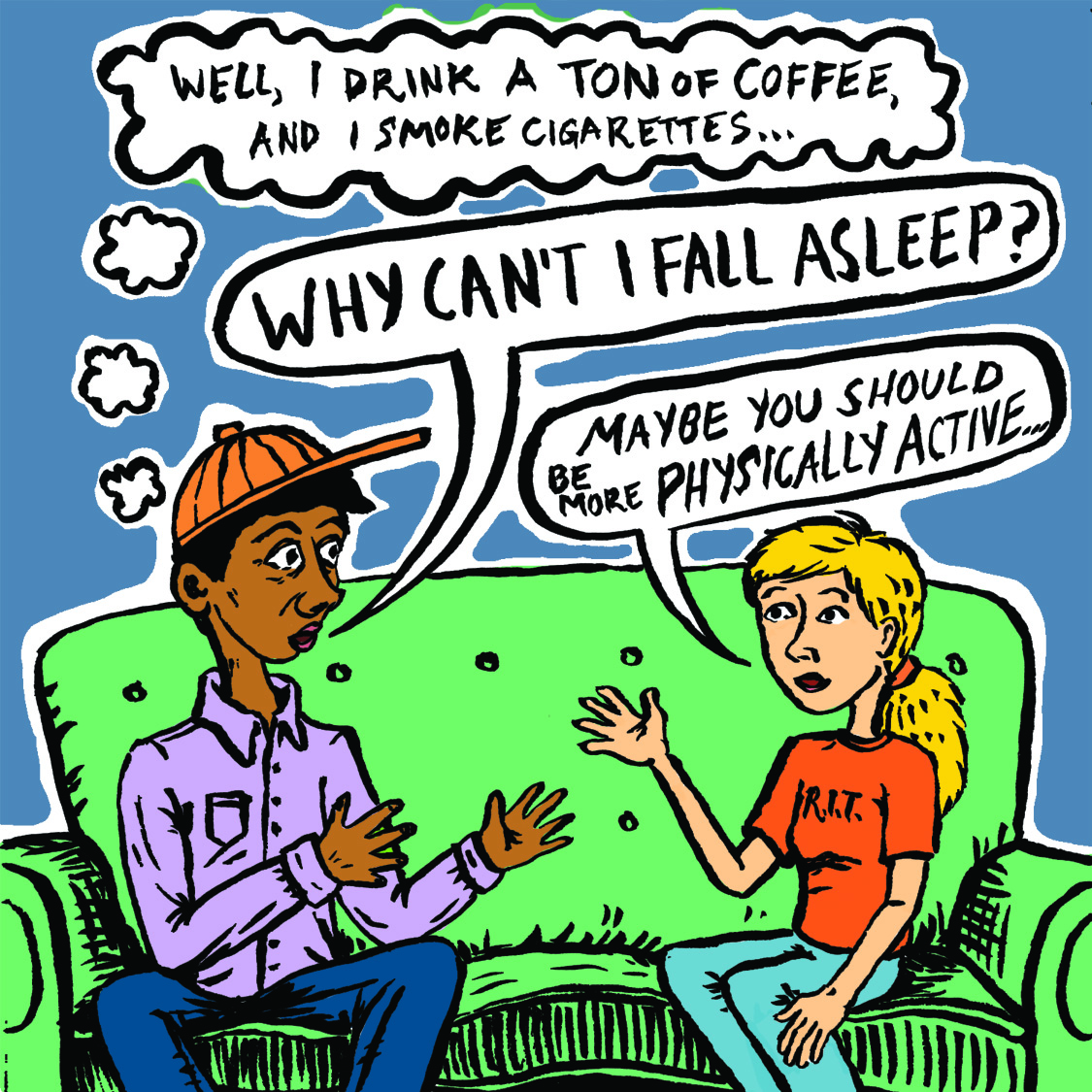 RIT’s Toni Gauthier, clinical intake coordinator and master of social work at the Counseling Center, has begun investigating bad sleeping habits or difficulties falling asleep among students. Working with the local Unity Sleep Disorders Center and Strong Sleep Disorders Center, she and the Counseling Center have created a comprehensive list of dos, don’ts and tips for sleeping as well as reasons why you may be losing sleep. This information was presented at a Wellness Wednesday lunch time presentation on October 16.
RIT’s Toni Gauthier, clinical intake coordinator and master of social work at the Counseling Center, has begun investigating bad sleeping habits or difficulties falling asleep among students. Working with the local Unity Sleep Disorders Center and Strong Sleep Disorders Center, she and the Counseling Center have created a comprehensive list of dos, don’ts and tips for sleeping as well as reasons why you may be losing sleep. This information was presented at a Wellness Wednesday lunch time presentation on October 16.
Gauthier explained that the average sleep cycle for a person should begin 20 minutes after they go to bed. Depending on the person, the individual should receive about eight hours of sleep. Individuals that may have insomnia must have trouble falling asleep after 20 minutes for approximately two months. People that wake up during early hours of the day and being unable to fall back asleep suffer from a type of insomnia known as sleep negligence.
After a person loses sleep, they are vulnerable to both physical and mental health issues. Such mental health issues that are caused include daytime fatigue, low concentration levels, reduced stress coping ability, critical thinking impairment, mood shifts and memory loss. Lack of sleep is also linked to possible cases of depression because of the mental and physical strain sleep deprivation can cause.
Being deprived of sleep can create several physical health issues such as weakened bones, a depressed immune system, vulnerability to cancer and diabetes and increased obesity. Gauthier mentioned a study at the University of Pittsburgh, which tested two different groups of college students: those who had sufficient sleep and those who did not. Afterwards the students were injected with the common cold, and those who had lacked sufficient sleep were found to be more vulnerable than those who did not.
There are ways to ensure a good night’s sleep. Students are advised to avoid “sleep robbers,” or caffeinated foods and drinks that greatly affect a person’s internal clock. Such items, as well as cigarettes — a natural stimulant — increase the body’s internal clock for the day. Limiting or avoiding these items will provide your body with a more natural sleeping cycle.
There is always the option to use sleeping enhancements such as ZzzQuil, Benadryl and melatonin. These pharmaceutical medications can be useful when your sleep debt, the amount of sleep lost during normal rest hours, is higher than usual. These prescriptions provide a temporary fix by giving an amnesiac effect, allowing you to forget your sleep debt. In truth, a person will only receive an extra 20 minutes of sleep after using these medications.
Another method is to increase physical activity during the morning, afternoon and early evening. By allowing the body to maintain a physical routine, the brain is taught when to work and when to rest. Those who have maintained a physical routine for more than four months have been known to add 45 minutes to their sleep cycle. Gauthier suggested that if you can’t sleep, try doing something for 30 – 60 minutes.
“To reinforce your sleeping environment, ask: To what extent does your body work with you or interfere with you?” said Gauthier. To answer this question, Gauthier suggested that students make a to-do list an hour before bed. This allows you to plan out your next day and rest without being too concerned about it. Gauthier also suggested a dark area for your rest, using ear plugs or masks if necessary.
If you are having trouble sleeping and think you may have insomnia, students are advised to visit the Counseling Center, located on the second floor of the August Center, to schedule sessions for a better nights rest. The Counseling Center’s hours are from 8:30 a.m. to 4:30 p.m. Monday, Tuesday, Thursday and Friday and from 8:30 a.m. to 7 p.m. on Wednesdays.
illustration by Emily Brooks







